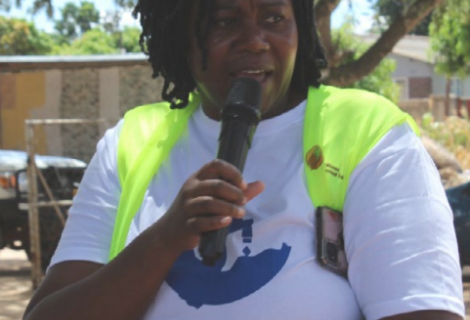WOMEN ADVOCATE FOR WATER ACCESS IN CHITUNGWIZA

Chitungwiza, like many other communities in Zimbabwe, is grappling with a severe water crisis. For decades, the government has been grappling with the challenge of providing adequate and safe drinking water due to deteriorating infrastructure and insufficient dams across the country. Compounding the issue is the political tension, with the government often blaming opposition-led local authorities for the crisis.
While the water situation may not be unique to Chitungwiza, what sets it apart is the agenda established by the Sprout Women Empowerment Trust, formerly known as the Muda Dam Movement.
For quite some time, the movement has held government accountable, advocating for the fulfillment of a pledge to construct Muda Dam near Beatrice. This would provide Chitungwiza with water from a dedicated source. Currently, Chitungwiza relies on a scant supply from Harare city, despite Harare struggling to provide sufficient water for its own needs.
Women, who are disproportionately affected by the lack of water, have felt a strong need to push for the government’s pledge to be fulfilled. Caroline Mutimbanyoka, a founding member of the Muda Dam movement and now Director of Sprout Women Empowerment Trust, shares how her and other women were inspired to advocate for water in Chitungwiza.
“I was compelled to address water issues among women due to the desperation I experienced firsthand, as well as witnessing the struggles endured by women in Chitungwiza. As women, we bear the responsibility of caregiving within our households, and the provision of water is central to that role. The absence of running water in our taps places an immense burden and pain on women, prompting us to take action.”
“As a mother, I understand the challenges of fetching water from distant sources, often endangering my own health and safety in the process. Through discussions with other women who shared similar experiences at water points, we collectively recognized the urgency to address this pressing issue. Thus, we embarked on a mission to secure adequate and safe drinking water for Chitungwiza residents. This marked the beginning of the Muda Dam movement.”
She goes on to explain the challenges that they have faced in their efforts to ensure that everyone accesses water in Chitungwiza.
“The politicization of water has posed significant challenges to our efforts in ensuring universal access to water in Chitungwiza. In many African countries, including Zimbabwe, water has become entangled in political agendas, making discussions around this vital resource incredibly complex.
“Our primary hurdle within the movement has been uniting women and fostering open dialogue about water issues amidst a highly politically charged environment. Merely bringing up the topic of water often leads to accusations and labeling, as discussions inadvertently intersect with broader political issues. This politicisation has made it exceedingly difficult to engage in constructive conversations about water provision and access.
“Furthermore, seeking support from the government for our cause has also been met with skepticism and accusations of political activism. This signals the reluctance of authorities to engage with citizens on critical issues like water provision, further complicating our advocacy work.”
To date, the team has undertaken various initiatives to advance their cause, including the development and submission of petitions, direct engagement with community leaders and local authorities, and mobilisation of community members.
In addition to advocating for the construction of the Muda Dam, the movement is dedicated to ensuring the safety of all water points for women and girls in Chitungwiza.
“We recognize that access to safe and reliable water sources is not only a matter of infrastructure but also a critical issue of safety and security, particularly for women and girls. Unfortunately, we have observed a concerning trend of violence occurring at water points, which poses a significant threat to the well-being and dignity of women and girls in our community.
“Addressing this issue requires urgent intervention to safeguard the rights and safety of women and girls. By creating safer environments at water points, we aim to alleviate the risks and vulnerabilities faced by women and girls while accessing essential water services. Our ultimate goal is to enable women and girls to access water in their homes without fear of violence or abuse, thereby enhancing their overall well-being and quality of life”, said Mutimbanyoka.
Water as a national crisis
The struggle for access to water extends beyond Chitungwiza, reflecting a national crisis in Zimbabwe. Despite government promises and efforts to construct dams, political will often falls short, leaving communities grappling with water shortages amid growing urban populations and the impacts of climate change.